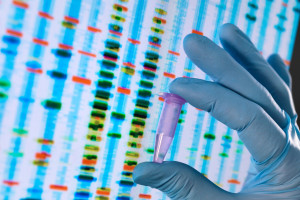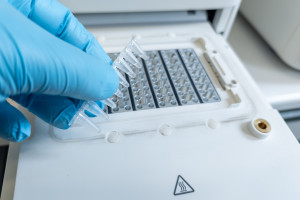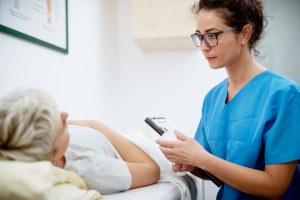Genetic testing in oncology. Important change from July 1

- On July 1, the regulation of the President of the National Health Fund enters into force amending the regulation on specifying the conditions for concluding and implementing contracts for hospital treatment and hospital treatment - highly specialized services
- Peripheral blood tests for mutations in the BRCA 1/2 genes in BRCA-dependent cancers will be able to be performed and billed on an outpatient basis. This applies to qualifications for drug programs dedicated to patients with BRCA-dependent cancers
- These tests will be financed both if the patient qualifies for the program, but also if the patient does not qualify for it.
- The change introduced by the order eliminates the need for unnecessary one-day hospitalizations, burdensome for patients and hospitals.
Tests on fresh mutation material in the BRCA 1/2 genes may be performed on an outpatient basis when qualifying for drug programs dedicated to patients with BRCA-dependent cancers - breast, ovarian, pancreatic or prostate cancer, as well as bile duct cancer.
On July 1, the regulation of the President of the National Health Fund enters into force amending the regulation on specifying the conditions for concluding and implementing contracts for hospital treatment and hospital treatment – highly specialized services, which concerns, among others, this issue.
Settlement of BRCA 1/2 gene tests as part of combined testsAccording to experts, this is an important step forward, because the previous structure of settlements made it impossible to finance outpatient tests, which forced facilities to perform one-day hospitalizations. This resulted in the involvement of staff, who were thus distracted from other tasks. The effect was also additional costs for the system related to unnecessary hospitalization.
During the consultation phase of the draft regulation, the method of settling basic and complex peripheral blood tests for BRCA 1/2 in outpatient settings was a subject of discussion. Hospitals were concerned that these tests would only be reimbursed for patients with confirmed mutations and who additionally met all the criteria for qualifying for the drug program. The question arose as to who would pay for these diagnostics in such a case.
It is now known that these studies will be financed both if the patient qualifies for the program, but also if the patient does not qualify .
As many as 40 percent of comments on the consulted draft regulation concerned the possibility of settling BRCA 1/2 gene mutation testing using the NGS (next-generation sequencing) method above 40 amplicons under the settlement product "Advanced genetic testing in cancer diseases".
Let us recall that the project published on the Fund's website on June 16 this year indicated that advanced genetic diagnostics, i.e. performing tests for BRCA 1/2 mutations using the next-generation sequencing method, will still require the patient to be admitted to hospital. The possibility of performing these tests under AOS would only apply to tests from the basic and complex test baskets, without taking into account the advanced test basket, which includes NGS.
Finally, the regulation provides the possibility of settling complex genetic tests using the NGS method by lifting the upper limit of amplicons. This will enable settling tests in the BRCA 1/2 genes as part of complex tests.
The National Health Fund explains- Enabling the settlement of mutation tests in the BRCA1, BRCA2 genes as part of basic and complex genetic tests, valued at approximately PLN 1.1 and 2.3 thousand, respectively, is dictated by the cost of these tests. Commercial prices of these tests (analysis of mutations in the BRCA1, BRCA2 genes using the NGS method from blood) oscillate around PLN 2 thousand. It is therefore difficult to justify financing this test as part of an advanced test, which is valued at over PLN 4.2 thousand - emphasized Paweł Florek , director of the Social Communication and Promotion Office of the National Health Fund, in a position sent to Rynek Zdrowia.
- It is worth noting that it is currently possible to perform these services under contracts for separately contracted services (in an outpatient mode). Therefore , performing the indicated tests does not require hospitalization, because they can be settled as part of separately contracted services. On the other hand, the changes presented in the draft regulation expand the availability of tests by allowing them to be settled also in an outpatient mode, but from a hospital contract - added Paweł Florek.
The regulation does not include the proposal to extend the possibility of genetic testing of fresh material to patients with lung cancer . As the Fund explains, it goes beyond the scope of the introduced regulation for genetic testing of fresh material in BRCA-dependent cancers.
Copyrighted material - reprint rules are specified in the regulations .
rynekzdrowia











